If you are looking for reliable and cost-effective wall flipping software, you must have heard of ExpressVPN, and if you are still not sure whether ExpressVPN China works or not, this article is written for you.

Does ExpressVPN work in China?
First of all, let’s talk about the conclusion: ExpressVPN China definitely works, it’s the daily main VPN for many of my friends in China, and it’s also the one that many of them have to update and renew every time before they go back to their home countries.ExpressVPN not only works, but also is probably the most stable and cost-effective wall-flipping software on the market nowadays. If I could only recommend one VPN, I would recommend ExpressVPN, in fact, ExpressVPN has been the top VPN on this site for several years.
Speaking of which, if you don’t want to continue to listen to my nonsense, you can go directly to the official website to take a look, and then decide whether to buy, 30 days no reason to refund, to determine whether it’s good for you or not this point of time is also enough, it is recommended that you buy the package with the lowest monthly cost (yearly payment package $8.32/month, buy one year and get 3 months free ).
I would also like to remind a few points: first of all, ExpressVPN is not a year dozens of yuan VPN, its price is not the most expensive on the market, but also not the cheapest, 30 days no reason to refund, dissatisfied with the customer service refund, do not have to get entangled; Secondly, ExpressVPN does not have a Chinese customer service, if the usual communication with the English language you will be very uncomfortable, but also please consider; and, as far as I know, currently ExpressVPN does not support WeChat, Alipay and other payment methods you are accustomed to in China, you need a card and VISA or MASTER mark multi-currency credit card. As far as I know, ExpressVPN does not support WeChat, Alipay and other payment methods you are used to in China, to buy ExpressVPN, you need a multi-currency credit card with VISA or MASTER mark on the card, although this kind of credit card is not difficult to apply for, and I have heard that some domestic friends have been rejected when purchasing for reasons that are not clear, but it’s not uncommon, or else millions of Chinese users of ExpressVPN would have already put their names on the card. Otherwise, millions of Chinese ExpressVPN users would have written their complaints all over the Internet.
Last but not least, during the weeks of annual meetings, or during sensitive periods such as June 4, ExpressVPN’s ability to penetrate the wall will be reduced, which can be manifested in slower connection speeds or inability to connect to certain nodes, slower opening of webpages after connecting, more frequent disconnection after connecting than usual, and some webpages cannot be opened even though the connection is normal, etc. The official ExpressVPN website usually releases an updated version of its version in high frequency prior to the entry of each sensitive period. The official ExpressVPN will usually release an updated version before each sensitive period, so be sure to keep it up-to-date. This is not a problem unique to ExpressVPN, almost all VPNs have problems during sensitive periods, just the severity is different.
A few reminders about ExpressVPN downloads
If you are able to open the ExpressVPN official website and complete the payment for the purchase without any problems, then there is nothing to worry about, just follow the instructions to download the client after the purchase. You are likely to have other wall flipping software hanging around, because otherwise you may not be able to open the official website or it may open slower. About 2 years ago, ExpressVPN had mirror domains and websites that were convenient for Chinese customers. Later, because the mirror sites were blocked by the GFW too quickly and almost lost their practical value, ExpressVPN officially stopped the mirror sites, and since then there has been one more obstacle for Chinese users to buy ExpressVPN from China. If you want to buy ExpressVPN and download it to your client and install it smoothly, I suggest you to go through other ways to flip the wall first, I know it sounds strange, you may think: “How can you ask me to buy wall-flipping software to flip the wall first? ” I know, but it can’t be helped, nowadays a lot of foreign first-tier VPNs are hard to buy domestically without going over the wall first, and it will only get harder in the future.
For domestic cell phone users, it is recommended to use the installation method provided by ExpressVPN. Apple phone users do not bother to register what the U.S. Apple ID, the initial setup directly refer to this page, do not download the client can also be used, the first successful wall, and then you can go to the U.S. IP address to register the U.S. ID is more simple and smooth, and then if you want to, you can go to download ExpressVPN’s iOS client; Android’s APK client (other non-iOS client also) The APK client for Android (and other non-iOS clients as well) doesn’t need to install any Google service framework, but can be downloaded directly from the settings page of ExpressVPN’s official website.
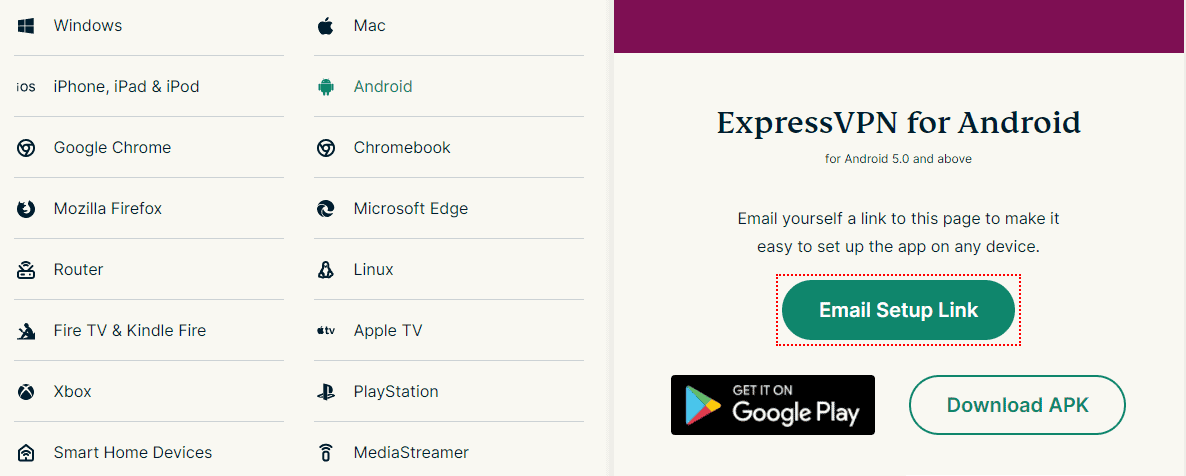
Also, please ignore the so-called: cracked ExpressVPN downloads offered on any website. This is not credible at all, because VPN software consists of a client and a server, and the communication between them changes all the time, so it’s impossible to cheat the official server by cracking it. In addition, even if there is a cracked version available for download, you should worry about the security issues, what if the cracked version of the software comes with a virus or Trojan horse? People who can crack software can also give software under the Trojan horse.
Benefits of ExpressVPN
Perhaps the fact that it works is the biggest advantage in itself, as there are probably no more than 10 VPNs on the market that can flip the wall from China.
connection speed
Take a look at ExpressVPN’s second-by-second connection, a speed that I don’t think needs any further comment:
This would be a credit to the Lightway protocol, I’ve used a lot of VPNs with the OpenVPN protocol (which ExpressVPN also supports), and it’s common for the connection to take more than ten seconds.
Privacy
ExpressVPN enforces a strict “zero-logging” policy. The ExpressVPN system does not log any information that could be traced back to your private Internet connection, including: real IP address, website browsing history, destination information of Internet requests, domain name resolution requests, etc. ExpressVPN only logs ExpressVPN only logs service maintenance information that you do not want, such as: client version, connection time, connected nodes, network traffic conditions. Even if all this information is leaked, it is impossible for any third party to use it to trace back to you personally.
There are many VPNs that say they have zero logs, but very few actually implement them. ExpressVPN’s zero-log policy has been audited by the PwC (2022/10/26: ExpressVPN completed an independent audit report by KPMG and Cure53 ) and is reliable. Also audited is ExpressVPN’s proprietary TrustedServer technology, which is used to ensure that even in the worst case scenario of a (physical) hijacking of a server, the risk of compromising a customer’s online privacy is minimized:
- Every time each ExpressVPN is started, all data is cleared (from memory) to reset the
- All ExpressVPN servers never write data to the hard disk, all data is in memory.
- The entire system software is reset and reinstalled every time you boot up.
- All program operations are closely monitored by our technical team.
If you’re surfing the web from China, you probably don’t want your ISP (Telecom/Mobile/Unicom) to detect that you’re frequenting some foreign “anti-communist forum”, and this requires two things. The first is that your VPN won’t betray you when you type anti-communist.com into your browser when you’re connected to a VPN, and the first is that the requests used to resolve the domain name don’t go through any domestic DNS servers in China, which are tightly controlled by the major broadband network operators, and that ExpressVPN provides ” private DNS ” services. ExpressVPN provides “Private DNS”, these services are set up in every ExpressVPN node, as long as ExpressVPN is connected, all DNS requests will be sent directly to these private DNS servers, no request will pass through the domestic DNS, the operator will not know what websites you visit.
Another technology that prevents traffic leaks is Kill Switch, which works by temporarily cutting off the network when ExpressVPN is connecting, thus preventing any data from being sent out over an unencrypted channel before the VPN connects, resulting in a data leak.ExpressVPN’s Kill Switch skips over the Split Tunneling configuration that doesn’t The Kill Switch of ExpressVPN will skip the program configured in Split Tunneling that does not go to the VPN, and it is well supported for Windows/Mac/Linux/Android systems.
smart connection
It is also called Split Tunneling, which is a very practical feature for those who usually need to access both internal and external networks. You probably don’t want to hang a VPN when you are surfing the internet from China, but you can’t open foreign websites if you turn off the VPN, so what should you do? With Split Tunneling, you can specify which apps go through VPN and which don’t in the ExpressVPN client. For example, if you use Edge to surf B-site and other domestic websites, and Chrome to open Youtube and other foreign websites, you just need to set Edge to Split Tunneling in the Split Tunneling settings of ExpressVPN. settings, you just need to set Edge as not to pass ExpressVPN (note that you need to disconnect from ExpressVPN and reconnect after the configuration is completed).
ExpressVPN’s Split Tunneling supports Mac, Windows, and Android, and is not yet supported because of iOS system limitations.
Another thing to note is that if you are using a multi-core browser and find that Split Tunneling doesn’t work after you have set it up, it is possible that the browser corresponds to more than one application, and you may need to take a closer look to see if this is the case, and if you still can’t get it configured correctly after several attempts, it’s best to ask customer service.
Disadvantages of ExpressVPN
China doesn’t have enough nodes to work with.
The nodes of the United States, Japan, Singapore and the United Kingdom are always available, with no sign of increase. From the feedback of our domestic friends, the nodes of the United States (Los Angeles) are generally the most stable and the fastest; the nodes of Japan are the second fastest, with a slightly worse connectivity than the nodes of the United States, and the nodes of the United Kingdom are similar; the nodes of Singapore seem to be not stable enough, with the lowest connectivity, so it is recommended that the nodes of the United States (Los Angeles) are the main nodes, and the nodes of Japan are used as a back-up. (Note: Starting from August 2022, all the above nodes have been seriously interfered with. ExpressVPN officials have updated the client and suggested users to switch to self-selected nodes ( Pick for me mode ).
Personally, I think it would be very useful to add more nodes in Hong Kong, Taiwan, South Korea, Australia, etc., especially for applications such as Netflix cross-region viewing. Hong Kong, Taiwan and South Korea nodes should have much lower latency due to their geographical proximity, which would be useful for playing foreign games. The Australian nodes will be useful for a large number of Chinese students to access school resources when they return home.
ExpressVPN’s one node corresponds to a random dynamic IP, IP pool according to the official disclosure of a node location has a few hundred IPs, the world a few thousand IPs, which is considered to be less nodes to make up for the shortcomings of this, otherwise a few million users in mainland China rely on the maintenance of the 4 IP addresses, is by no means sustainable. This is also the need for users to update the client’s main reason, otherwise you will find the most stable Los Angeles nodes one day also have a sudden failure to connect the time.
Split Tunneling does not support filtering by URLs
Split Tunneling is obviously a very important feature for domestic wall users, it allows different applications to divert traffic, programs accessing domestic resources don’t go through the VPN, and programs accessing foreign networks go through the VPN.ExpressVPN’s Split Tunneling is a bit weak compared to Astrill or even NordVPN, and doesn’t support differentiation by URL, which makes it unnecessarily cumbersome. ExpressVPN’s Split Tunneling feature is a bit weaker than Astrill or even NordVPN, and it doesn’t support differentiation by URL, which makes it unnecessarily complicated. For example, in order to keep traffic to Google and Baidu separate, if you could differentiate by URL, you would only need to exclude all traffic to baidu.com from VPN traffic, rather than installing a browser, setting it up with a no-VPN rule, and then using that browser exclusively to access Baidu (and other Chinese websites). Another problem with filtering by URL is that you have to disconnect every time you want to change the configuration.
Chinese localization is limited
ExpressVPN has at least a few million users in mainland China. Originally there was a “mirror site” that could be opened directly from China, but that was officially canceled, so the official site you can access now is barely open, and in many cases it won’t open. Alipay/WeChat payments were originally supported, but have since been canceled, and now you can only buy ExpressVPN with a credit card. The official website has also never supported Chinese pages, nor does it provide Chinese customer service. Although you usually don’t need to find customer service much, when you need to communicate, I believe that many people will still find it not convenient enough.
Another feeling about customer service is that ExpressVPN’s English customer service standard is also declining, in the past there are problems to find customer service, a question and answer can be very smooth, there are problems many times a few minutes can be solved, even if it is a technical problem can be very quickly and accurately recovered, and now ExpressVPN customer service is asked a technical question, it always feels like the Live Chat personnel Now when ExpressVPN customer service is asked technical questions, it always feels like the Live Chat staff can’t figure out what you’re talking about.
What can I do if I have connection problems?
Recently, some of our friends in China have written to us with feedback that the connection quality of ExpressVPN has dropped and they can’t even connect to it. If you are experiencing this kind of problem, the first thing you should do is to open the ExpressVPN client and click on the “Check for status updates” link shown in the green box in the picture below, this will open the ExpressVPN mirror site (available in China) help page for users in mainland China. This will open the help page of ExpressVPN mirror site (openable in China) for mainland China users, which should have all the information you need.
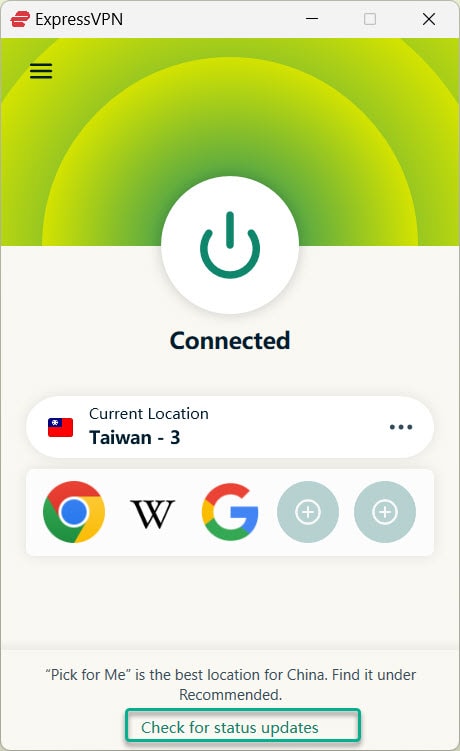
- Make sure your ExpressVPN client is up to date!
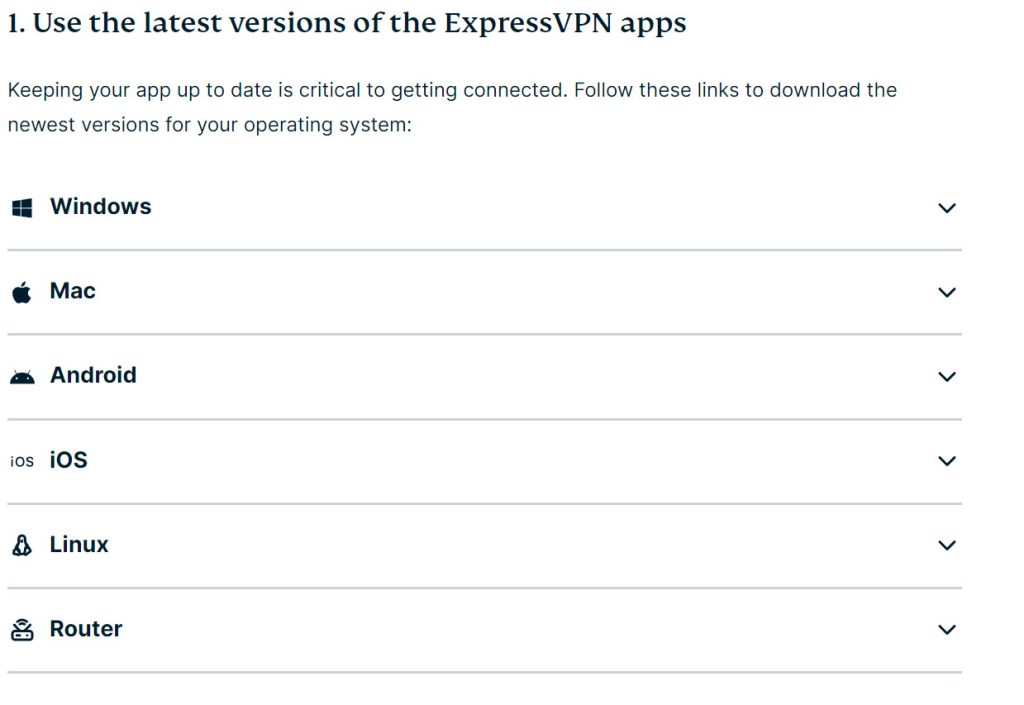
2. Set the protocol of the ExpressVPN client to “Automatic”.
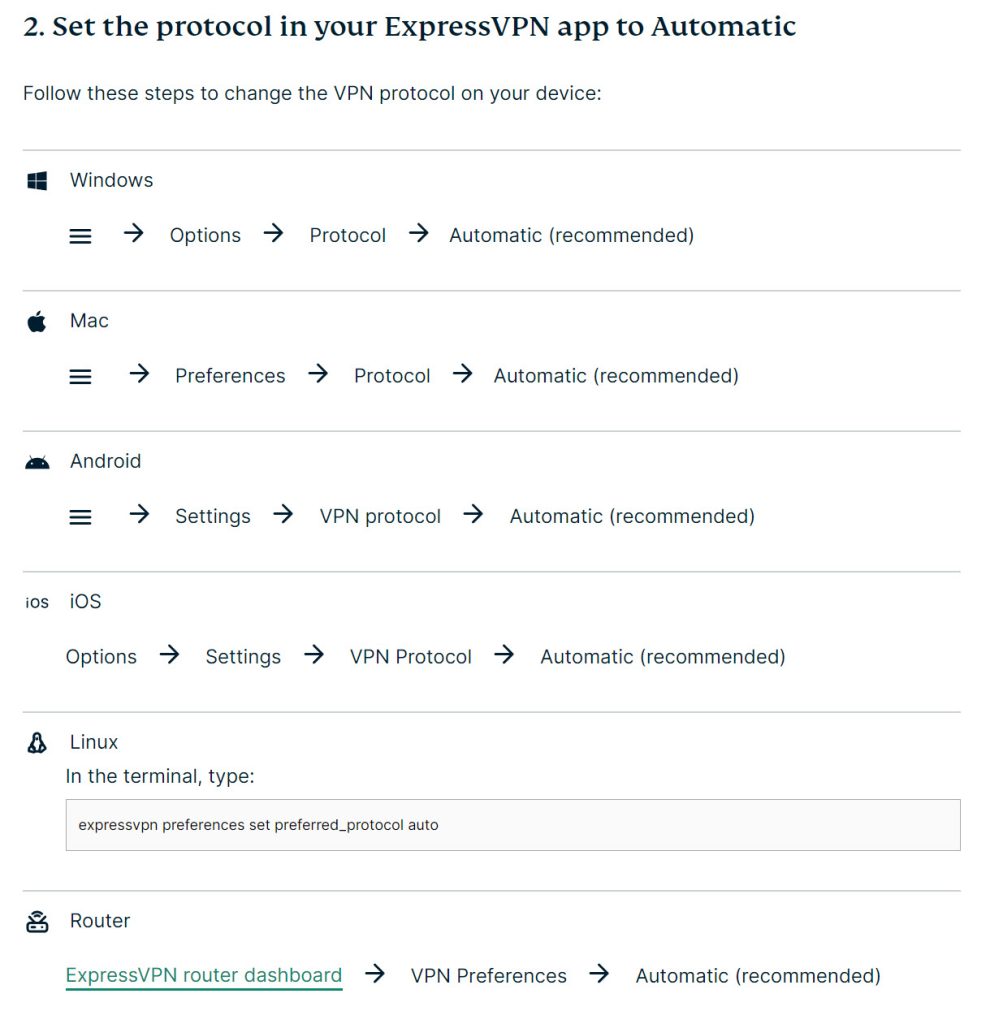
3. Retry the connection, which may sometimes have to wait

4. Prioritize the use of these nodes
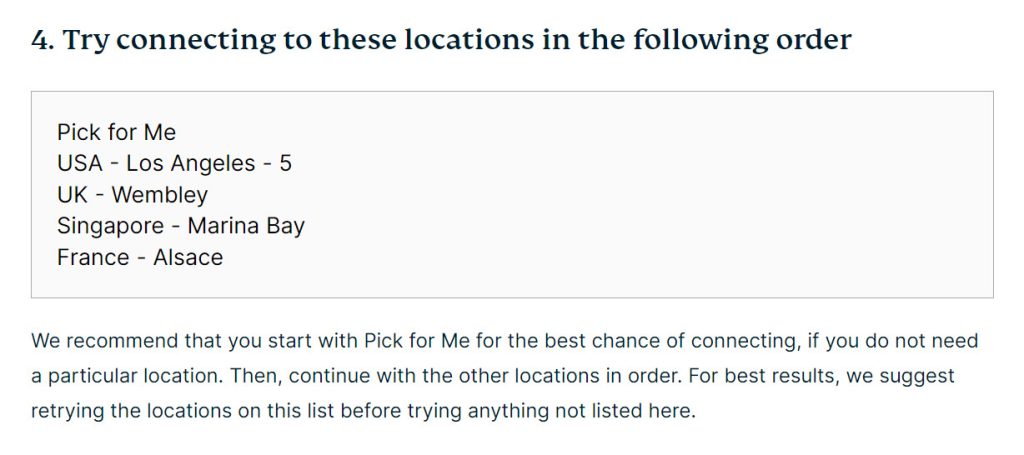
After our actual testing, Pick for me quite often is not the best choice of node, Smart Location, i.e. the node with the lowest ping value automatically detected by the client, may be the most worthwhile to try.
5. Bookmark this help page

Bookmarking this help page URL is necessary because most of the time, problems using ExpressVPN in China can be solved with the information on this page, and based on our own testing experience, most of the time it can actually be solved by simply downloading the latest version of the ExpressVPN client, completing the installation and restarting it.
FAQ
What about ExpressVPN? Is it good for China or not?
Which city are you in? If it is the north, Guangzhou, Shenzhen, Hangzhou and other first-tier provincial capitals, I think basically I can find all have found a friend in the country measured, of course, not that every big city in China I measured, but from the results of the test, I think it has been enough to illustrate the problem, ExpressVPN China can be used, the use of a very simple and intuitive, rather than continue to struggle, why not buy it and use it, there are 30 days of no reason for refunds, what can each I’m not sure what I’m worried about.
How do I know that the ExpressVPN client needs to be updated?
The client interface will be prompted, the interface also has Check for status updates at the bottom of the green connection (note that not expressvpn.com/latest), is displayed for Chinese customers (the URL has the word china), often click in to take a look at the update on the next.
How frequent do updates need to be?
It is recommended to update as soon as you are prompted to do so, at the latest not a week later, otherwise there may be connection problems due to the old version.ExpressVPN’s mobile client can be updated automatically, but the desktop client can’t, so you have to update it manually.
Why is ExpressVPN more expensive than many VPNs?
ExpressVPN has been able to use for ten years, the nodes are refined, the device support is comprehensive, the function is mature, the security is unique in the industry, it is worth the price, or do you prefer a few dozens of dollars a year just use a few days to run away from the cheap VPN?